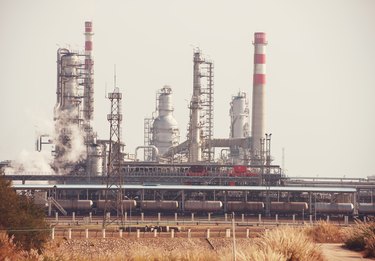
"Hydrocarbon" and "carbohydrate" sound similar but are two very different types of compounds. Hydrocarbons consist of purely carbon and hydrogen, while carbohydrates also contain oxygen. Living organisms metabolize carbohydrates for energy, whereas hydrocarbons are used as fuels and in industrial applications.
Hydrocarbons
Video of the Day
Hydrocarbons are the simplest organic, or carbon-based, compounds. They are made only of carbon and hydrogen but can be virtually any size and shape. Methane, or swamp gas, is the simplest hydrocarbon, with the chemical formula CH4. Other common hydrocarbons include propane, used to fuel gas burners, and octane, an ingredient in most automobile gasoline. Benzene, an industrial solvent, is also a hydrocarbon.
Video of the Day
Carbohydrates
Not all compounds of carbon, hydrogen and oxygen are carbohydrates. To be a carbohydrate, a compound must have twice as many hydrogen atoms as oxygen atoms, explain Drs. Reginald Garrett and Charles Grisham in their book, "Biochemistry." Some chemists consider formaldehyde, with the formula CH2O, to be a carbohydrate, but most consider only the compounds relevant to biochemistry to be carbohydrates -- making glyceraldehyde, with the formula C2H4O2, the simplest carbohydrate molecule.
Hydrocarbon Uses
Under ideal conditions -- in an environment high in oxygen -- hydrocarbons can burn to produce carbon dioxide and water. There is rarely enough oxygen present for hydrocarbons to burn ideally, so combustion also results in the production of carbon monoxide, a toxic gas. Burning hydrocarbons make good fuels, as they produce a large quantity of heat. Natural gas, petroleum, coal, and gasoline, which is made from petroleum, are all examples of hydrocarbon fuels.
Carbohydrate Uses
Carbohydrates can burn in oxygen to produce carbon dioxide and water, but they are most commonly "burned" in living organisms when they are metabolized by cells. In cells, the products of carbohydrate combustion are still carbon dioxide and water; however, the energy released is stored and used by cells, rather than being liberated as light and heat, explain Drs. Mary Campbell and Shawn Farrell in their book, "Biochemistry."